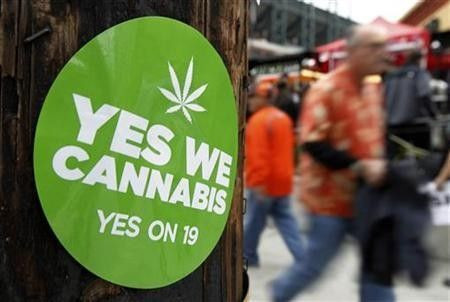Marijuana Legalization Catches Fire at White House Social Media Events

What do you say to this growing voter constituency? a retired Los Angeles deputy police chief, Stephen Downing, asked President Barack Obama.
Downing uploaded his recorded question for Obama to YouTube and submitted it to the White House's Your Interview with the President contest, in which Americans can vote on the questions they want Obama to answer Monday at 5:30 p.m.
His question is one of the most liked submissions. But the constituency Downing mentioned isn't concerned about immigration, raising taxes on the 1 percent or domestic oil production. Downing, a member of a group called Law Enforcement Against Prohibition, is referring to people who want marijuana legal and regulated.
And below Downing's video are pages and pages of inquiries about the president's drug policy and marijuana legalization -- many racking up hundreds, if not thousands of votes. Downing's video was liked by 4,501 people, though 196 did not approve of the question.
For the White House, this is routine. The administration attempts to reach out using social media to learn about and address concerns. Nearly all of the questions are about legalizing marijuana.
We always try to take the opportunity to get our message out whenever the White House puts out these public forums, said Tom Angell, media relations director for LEAP, a group that advocates legalizing and regulating the plant. It appears to be one of our only opportunities to engage with policy makers and our nation's leaders on this issue.
Angell said during the George W. Bush administration, marijuana advocates would have to crash his drug czar's press conferences to get a question answered. Now, they are submitted online and validated by the throngs of supporters who vote for them.
And the Obama administration has tackled their concerns, rather than ignoring them.
In November, Obama drug czar Gil Kerlikowske defended the administration's support for keeping marijuana on the list of Schedule I controlled substances during an initiative called We the People, which allowed Americans to petition the White House for policy changes. Naturally, the initiative was a magnet for petitions on marijuana legalization.
During last year's Your Interview with the President YouTube contest, a LEAP member asked if there will be a time to discuss the legalization of marijuana to combat the illicit drug trade and terrorism financing. Obama, who opposes legalization, replied, I think this is an entirely legitimate topic for debate.
We thought it was a huge victory for a sitting president to say that, Angell said.
The White House on Weed
Drug law reform advocates have embraced social media to push the administration on marijuana legalization, which the White House opposes, citing health and safety reasons.
Yet the Obama administration has made notable policy changes on marijuana and drugs. The White House has narrowed the disparity in sentencing for crack and cocaine offenses and focused on alternatives to the War on Drugs and mass incarceration. The administration touts its spending priorities, giving near-equal weight to drug treatment and enforcement.
More notably, Obama directed the Department of Justice to allow federal prosecutors discretion with enforcement cases so that those who comply with state medical marijuana laws will be spared while those conducting illegal drug activity are punished.
But marijuana reform advocates become incensed when they believe the administration is falling short of Obama's goals and rhetoric. For instance, they criticized Obama's Justice Department directive on medical marijuana because there are crackdowns on dispensaries and growing operations that prosecutors say run afoul of state and federal drug laws. Advocates have also accused Obama, in some respects, as being worse on drug policy than Bush.
Changing Attitudes
In a change from previous administrations, social media are now commonplace and have enabled the reform movement to mobilize. Social media's prominence also happened to coincide with a growing support for legalizing marijuana, according to polls. Gallup reported in October that support for legalization hit a record 50 percent, with support coming mainly from liberals and young voters.
Marijuana policy is also becoming a state issue. California voters in 2010 wrestled with a proposition to legalize pot -- it failed, 53 to 46 percent -- and Washington state is on the cusp of certifying an initiative that could put the matter on the ballot soon.
With that level of support and interest, Obama is no longer laughing at questions about marijuana legalization as he did in 2009. Advocates grumbled at Obama's dismissive response, but believe he has since taken the issue more seriously, even if he supports maintaining marijuana's illegal status.
It's unclear if Obama will answer Downing's question about this growing constituency which supports legalizing marijuana; a White House spokesperson did not respond to a request for comment.
Ultimately, what he should be doing is furthering the debate rather than shutting down the debate, said Bill Piper, national affairs director for the Drug Policy Alliance. That goes a long way to opening up a national conversation on the issue.
© Copyright IBTimes 2025. All rights reserved.



















